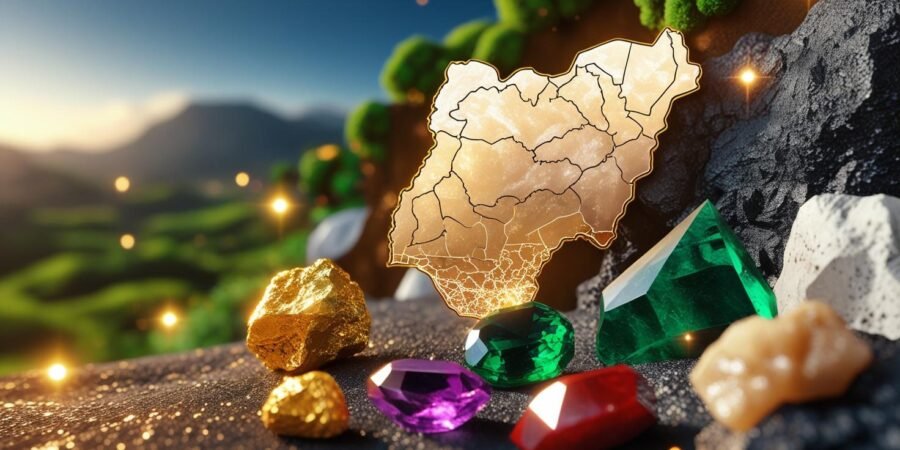Nigeria, often hailed as the “Giant of Africa,” isn’t just rich in culture and people; it’s also a powerhouse of natural resources. While oil often grabs the headlines, the nation’s vast solid mineral deposits hold immense, largely untapped potential. These valuable resources, from precious metals to industrial minerals, are spread across various states, significantly contributing to their economies and offering exciting investment opportunities.
If you’re searching for “states with the highest minerals in Nigeria,” you’re in the right place. This comprehensive guide shines a light on the top 12 states leading in mineral wealth, detailing the key resources that make them so important.
Intrigued by Nigeria’s vast mineral wealth and wondering how to turn this potential into profitable ventures? Download our comprehensive ebook, Unlocking Nigeria’s Mineral Wealth: 113 Lucrative Business Ideas, which provides a detailed roadmap to diverse opportunities for entrepreneurs and investors in this booming sector.
Nigeria’s Untapped Goldmine: A Look at Solid Mineral Potential
Nigeria’s geology is incredibly diverse, featuring crystalline basement complexes, sedimentary basins, and volcanic rocks – all perfect hosts for a wide array of minerals. The Nigerian Geological Survey Agency (NGSA) plays a vital role in mapping and evaluating these resources, providing essential data for exploration and investment. For years, the solid minerals sector took a backseat to oil and gas, but a renewed government focus and growing investor interest are steadily changing this narrative.
The Top 12 States and Their Mineral Riches:
While nearly every Nigerian state has some mineral deposits, the following 12 stand out due to the quantity, variety, and economic significance of their resources:
1. Nasarawa State: The Home of Solid Minerals
Often called the “Home of Solid Minerals,” Nasarawa State is arguably the most significant player in Nigeria’s mineral landscape. Its key resources include:
- Barytes: Crucial for the oil and gas industry as a drilling fluid.
- Lithium: A highly sought-after mineral, vital for electric vehicle batteries and other clean technologies. Recent discoveries here highlight its immense potential.
- Gold: Deposits are found in various locations, attracting both artisanal and small-scale miners.
- Other significant minerals include Columbite, Dolomite, Feldspar, Mica, Talc, various Gemstones, and Clay.
Nasarawa’s strategic location and diverse mineral base make it an incredibly attractive investment destination.
🟡 Thinking of exploring for gold in Nigeria? Whether you’re a miner, landowner, or investor, the GDX-8000 Gold Detector is the trusted tool transforming local gold discovery across Nigeria and West Africa.
Detect deeper, find faster, and uncover real opportunities beneath your land.
👉 Order your Original GDX-8000 NOW – exclusively from the Nigerian Mineral Exchange (NME), Nigeria’s leading mining marketplace.
💬 Chat directly with our support team on WhatsApp: +234 8130799304
2. Plateau State: A Hub of Mineral Diversity
Plateau State truly lives up to its reputation for having the most diverse mineral deposits in Nigeria. It boasts an impressive array of over 20 minerals, including:
- Tin: Historically a major producer, especially from the Jos Plateau.
- Columbite/Tantalite: Important for high-strength alloys.
- Gemstones: Such as emerald, aquamarine, ruby, tourmaline, topaz, garnet, and amethyst.
- Lead/Zinc: Significant deposits found across the state.
- Other resources include Bauxite, Bentonite, Clay, Iron Ore, Kaolin, and Wolframite.
Plateau’s rich mineral endowment makes it a prime target for both small and large-scale mining operations.
3. Kogi State: The Confluence of Industrial Minerals
Known as “The Confluence State,” Kogi is not only strategically located but also immensely rich in vital industrial mineral resources, particularly:
- Limestone: Home to some of the largest limestone deposits in Africa, essential for cement production.
- Iron Ore: Significant reserves, with mining operations at Itakpe.
- Coal: Important for power generation.
- Additional minerals include Dolomite, Feldspar, Gypsum, Kaolin, Marble, Talc, Tantalite, Mica, and Gold.
Kogi’s industrial minerals are crucial for Nigeria’s infrastructure development and manufacturing sector.
Considering a Mining Venture in Nigeria? Understanding the mineral landscape is vital, but launching a successful enterprise requires a strategic approach. Download our ebook, A Comprehensive Guide to Entrepreneurship in Nigeria’s Lucrative Mining Industry. It will walk you through the essential steps, from planning to operations.
4. Kaduna State: A Powerhouse of Mineral Wealth
Kaduna State is a true powerhouse, with over 20 identified mineral types. It’s particularly known for:
- Gold: Significant gold deposits, especially in areas like Birnin Gwari.
- Gemstones: Including amethyst, aquamarine, garnet, ruby, and sapphire.
- Tantalite/Columbite: Valuable for high-tech industries.
- Other resources include Kaolin, Clay, Graphite, Asbestos, Kyanite, Mica, Rock Crystal, and Tourmaline.
Kaduna’s rich mineral endowment and established mining activities position it as a key contributor to Nigeria’s solid mineral economy.
5. Ogun State: Southwest’s Industrial Mineral Giant
Located in the Southwest, Ogun State has emerged as a major player in mineral production, especially for industrial minerals. It’s a top producer of:
- Limestone: Fueling the booming cement industry.
- Bitumen: The state holds a significant portion of Nigeria’s massive bitumen reserves, offering immense potential for road construction.
- Other minerals include Clay, Feldspar, Phosphate, Gemstone, and Kaolin.
Ogun’s proximity to Lagos and its abundant industrial minerals make it a key economic hub.
6. Cross River State: Diverse Deposits in the South-South
In the South-South region, Cross River State is blessed with diverse mineral resources, notably:
- Limestone: A substantial contributor to the country’s limestone production.
- Other significant minerals include Barite, Lead/Zinc, Lignite, Manganese, Lithium, Mica, and gemstones.
The state’s mineral deposits offer potential for various industries, from construction to chemical manufacturing and jewelry.
7. Benue State: Beyond Agriculture, Rich in Minerals
Known as the “Food Basket of the Nation,” Benue State also holds significant mineral wealth, with a focus on:
- Coal: Major deposits, contributing to Nigeria’s energy potential.
- Further resources include Limestone, Barite, Clay, Gemstones, Gypsum, Fluorite, Mica, Lead/Zinc, Marble, and Ilmenite.
Benue’s mineral resources complement its agricultural dominance, offering a diversified economic base.
8. Edo State: Varied Resources for Growth
Edo State, in the South-South, is another state with a broad spectrum of mineral resources, including:
- Bitumen: Significant deposits, alongside Ondo State.
- Limestone, Clay, Dolomite, Lithium, Phosphate, Glass Sand, Gold, Gypsum, Iron Ore, Lignite, and Marble.
Edo’s mineral wealth, particularly its bitumen, positions it for future industrial growth.
9. Ondo State: Bitumen Hotspot
The “Sunshine State” is highly prospective for mineral exploration, boasting:
- Bitumen: One of the largest bitumen reserves globally, yet largely unexploited.
- Other resources include Feldspar, Gemstone, Glass Sand, Gold, Granite, Gypsum, Kaolin, Limestone, Clay, Coal, Dimension Stones, and Oil/Gas.
Ondo’s bitumen reserves represent a massive economic opportunity for Nigeria.
10. Osun State: A Gold-Rich Region
Located in the Southwest, Osun State is recognized for its valuable mineral deposits, including:
- Gold: Notable gold occurrences, particularly in the Ilesha area.
- Further minerals include Columbite, Granite, Talc, Tantalite, and Tourmaline.
Osun’s gold reserves attract both artisanal and commercial miners, contributing to its local economy.
11. Niger State: Expansive Land, Extensive Minerals
As Nigeria’s largest state by land mass, Niger State is equally rich in mineral resources:
- Gold: Significant gold-bearing formations across various regions.
- Iron Ore: Important deposits that complement those in Kogi.
- Additional minerals include Talc, Clay, Dolomite/Marble, Feldspar, Gypsum, Kaolin, Salt, Tourmaline, Mica, Lithium, and Tantalite.
Niger State’s vast land area and diverse mineral base offer considerable exploration potential.
12. Ebonyi State: A Legacy of Lead and Zinc
In the Southeast, Ebonyi State is well-known for:
- Lead/Zinc: Major lead and zinc deposits, historically a hub for mining these metals.
- Salt: Significant salt springs.
- It also has occurrences of Gold and large deposits of Limestone- remember the Nkalagu Nigercem Cement.
Ebonyi’s lead and zinc resources are crucial for various industrial applications.
The Road Ahead: Maximizing Nigeria’s Mineral Potential
Nigeria’s solid mineral sector holds immense promise for economic diversification, job creation, and industrial growth. However, unlocking this potential requires a concerted effort:
- Policy Implementation: Consistent and transparent policies are needed to attract reputable investors.
- Infrastructure Development: Improving transportation networks is crucial to facilitate mineral extraction and processing.
- Security: Addressing illegal mining and ensuring the safety of mining operations is paramount.
- Value Addition: Encouraging local processing and value addition to minerals, rather than just exporting raw materials, will create more wealth.
- Geoscientific Data: Continuous geological mapping and data generation by agencies like the NGSA help de-risk investments.
By focusing on these areas, Nigeria can unlock the full potential of its rich mineral endowments, transforming these underground treasures into tangible economic prosperity for its states and its people. The increasing online interest in “states with the highest minerals in Nigeria” clearly shows a growing awareness and desire to explore this vital sector.
Ready to Act on Nigeria’s Mineral Wealth?
This guide has laid out the incredible potential of Nigeria’s solid mineral sector. For serious investors and prospectors, the next crucial step is often mining site acquisition. Don’t navigate this complex process alone. Gain a clear, insider’s advantage with our ebook: Nigeria’s Mineral Wealth: The Insider’s Guide to Mining Site Acquisition

READ Also:
The Ultimate Guide to Starting a Mining Company in Nigeria
Need a Mining License or Mineral Trade Permit in Nigeria? Here’s How We Can Help





Leave a Reply